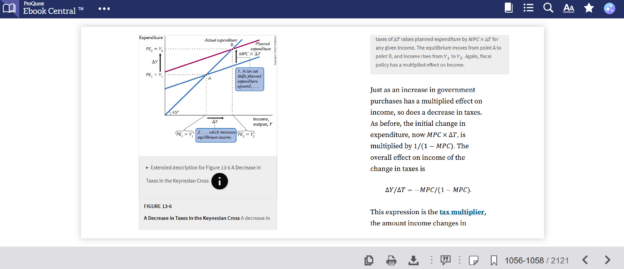Since the introduction of the European accessibility act, which aims to improve the accessibility of products and services, the EPUB format has been preferred to the PDF format as the standard for the online provision of e-books. Several e-book providers such as Ebook Central (Proquest) point out this change in recent reports, as it has an impact on the use of e-books in their portals.
What is problematic about this?
EPUB files adapt flexibly to screen sizes and fonts. The disadvantage: there are no fixed page numbers in the documents. In science, however, page numbers are required in many citation guidelines in order to make citations retrievable. In this blog article, we explain how to cite from EPUBs despite the lack of page pagination.

Screenshot of a “page view” of an EPUB e-book in Ebook Central. The “page number” at the bottom right can vary.
What alternatives are there to specifying pages?
What to do if the EPUB format does not provide fixed pages? There are various alternatives for referencing citations from EPUB files:
- Chapter or section numbers (e.g. chapter 3, paragraph 4)
- shortened versions of chapter or section headings
- Percentages or positions (e.g. 45%, 1654 loc for Kindle readers)
What do the official handbooks say?
If you look at the relevant manuals, you will find rules on how to cite in continuous text or footnotes and how to create bibliographies. We show some examples here. However, deviations are possible in individual cases, as even the handbooks leave room for interpretation in places.
| STYLE | REFERENCE LIST | SAMPLE | REFERENCE LIST | EXAMPLE | In-Text-CITATION | EXAMPLE |
|---|---|---|---|
| APA | Author, A. A. (Year). Title of the book: Subtitle of book (Edition, if applicable). Publisher. DOI or nondatabase URL (if available) | Mankiw, N G. (2025). Macroeconomics (12th ed.). Macmillan. | (Mankiw, 2025, Chapter 2-1) |
| Chicago | Author Last Name, Author First Name. Title of the Book. Place of Publication: Publisher, Year. DOI or URL (if available) or name of database. e-book reader. | with URL from commercial database:
Mankiw, Nicholas Gregory. Macroeconomics. New York: Macmillan Publishers, 2025. https://ebookcentral.proquest.com/lib/tuchemnitz/detail.action?docID=31813253 with indicating e-book format when used via e-book reader: Mankiw, Nicholas Gregory. Macroeconomics. New York: Macmillan Publishers, 2025. ProQuest Ebook Central. EPUB. |
Foot- or Endnotes are used. Example:
“Economists distinguish between two types of quantity variables: stocks and flows. A stock is a quantity measured at a given point in time, whereas a flow is a quantity measured per unit of time.”² Foot-/Endnote: |
| Harvard
(nach: Cite Them Right 2022) |
Author surname(s), initial(s). (Year Published) Title. Edition. [e-book reader]. Place of Publication: Publisher. Available at: URL or DOI (Accessed: day month year). | Mankiw, N. G. (2025) Macroeconomics. 12th edn. [EPUB]. New York, NY: Macmillan. Available at: ProQuest Ebook Central https://ebookcentral.proquest.com/lib/tuchemnitz/detail.action?docID=31813253&ppg=295 (Accessed: 19 February 2025). | (Mankiw, 2025, chapter 2-1). |
| MLA | Last Name, First Name of First Author, et al. Title of Book: Subtitle if Any. Edition if given and is not first edition, e-book ed., Publisher Name often shortened, Year of publication. Name of Database, DOI number/URL/Permalink or e-book format. | with URL from commercial database:
Mankiw, Nicholas Gregory. Macroeconomics. 12th ed., e-book ed., Macmillan, 2025. ProQuest Ebook Central, https://ebookcentral.proquest.com/lib/tuchemnitz/detail.action?docID=31813253&ppg=295. with indicating e-book format when used via e-book reader: Mankiw, Nicholas Gregory. Macroeconomics. 12th ed., e-book ed., Macmillan, 2025. EPUB. |
(Mankiw, ch. 2-1) |
| IEEE | J. K. Author, “Title of chapter in the book,” in Title of Published Book, xth ed. City of Publisher, State, Country: Abbrev. of Publisher, year, ch. x, sec. x. [Online]. Available: http://www.web.com | [1] N. G. Mankiw, Macroeconomics, 12th ed. New York, NY, USA: Macmillan (Inc.), 2025. [Online]. Available: https://ebookcentral.proquest.com/lib/tuchemnitz/detail.action?docID=31813253&ppg=295 | consecutive numbering of references in text: [1, ch. 2-1] |
What else should be considered when referencing e-books?
If possible, a DOI or (nondatabase) URL with access date should always be linked in order to make the source clearly traceable. In general, the DOI is preferable to the URL in the citation context, as it never changes and always refers to the same target object. If there is only one URL and this URL links to a source in a commercial database behind a paywall, it can be replaced by the name of the database (e.g. ProQuest Ebook Central) according to some regulations. However, the APA guidelines explicitly state that the name of a database may be omitted if the sources can also be found elsewhere (e.g. on another platform).
Some citation guidelines recommend specifying the format of the e-book reader used, such as Kindle or EPUB, when citing from e-books that are accessed without a URL on an e-reader, an e-reader app or on a computer with e-reader software.
Where can I find more information?
For all those who want to delve deeper: The most important citation standards provide helpful information – especially on detailed questions regarding the correct citation of e-books without page numbers. The current editions of the regulations can be found in the University Library collection:
- Publication Manual of the American Psychological Association (7th edition from 2020)
- Chicago Manual of Style (18th edition from 2024)
- Harvard (the exact application of the guidelines depends on the university and lecturer, we use the internationally used versions in Cite Them Right from 2022)
- MLA handbook (9th edition from 2021)
- IEEE Reference Guide (version V 3.28.2025 from 2025)
In addition, our MIKA e-learning module on Citation & Referencing provides a comprehensive overview of academic citing and referencing in general (it will be availabe in English soon). We are also happy to discuss all questions relating to citation and reference management with Zotero and Citavi in our personal “Book a Librarian” consultations.

